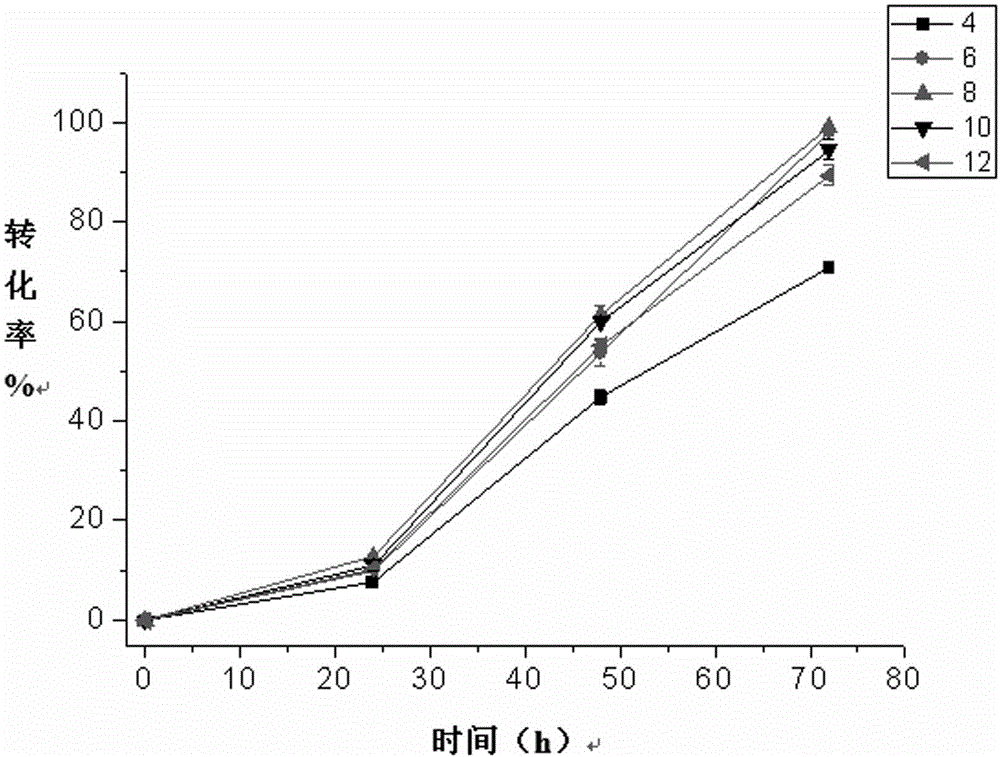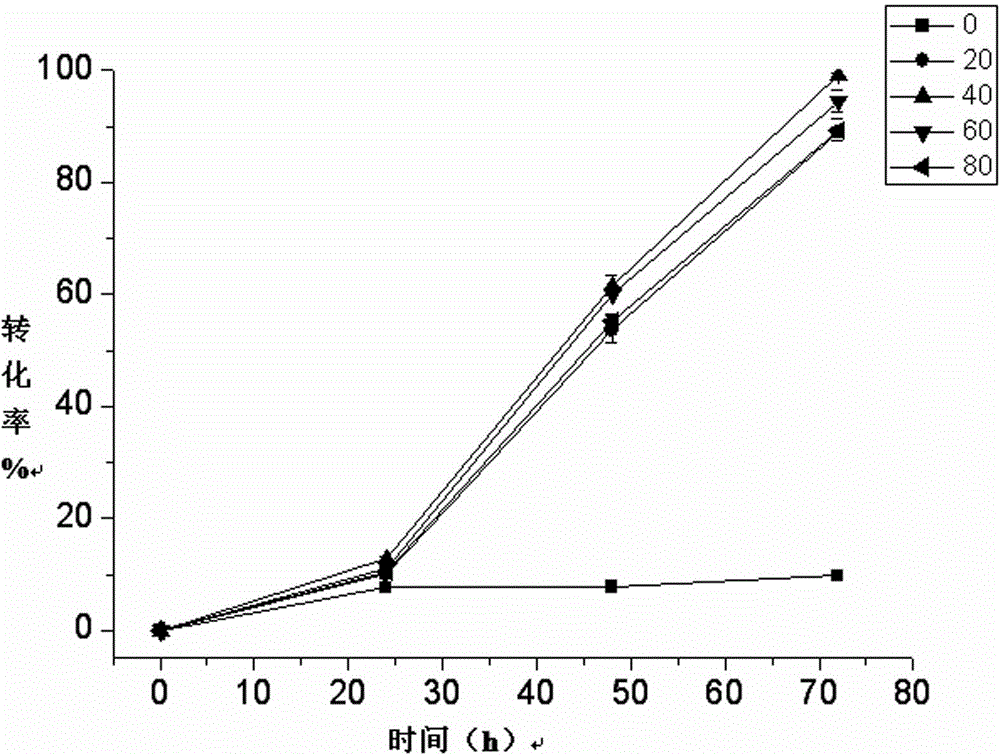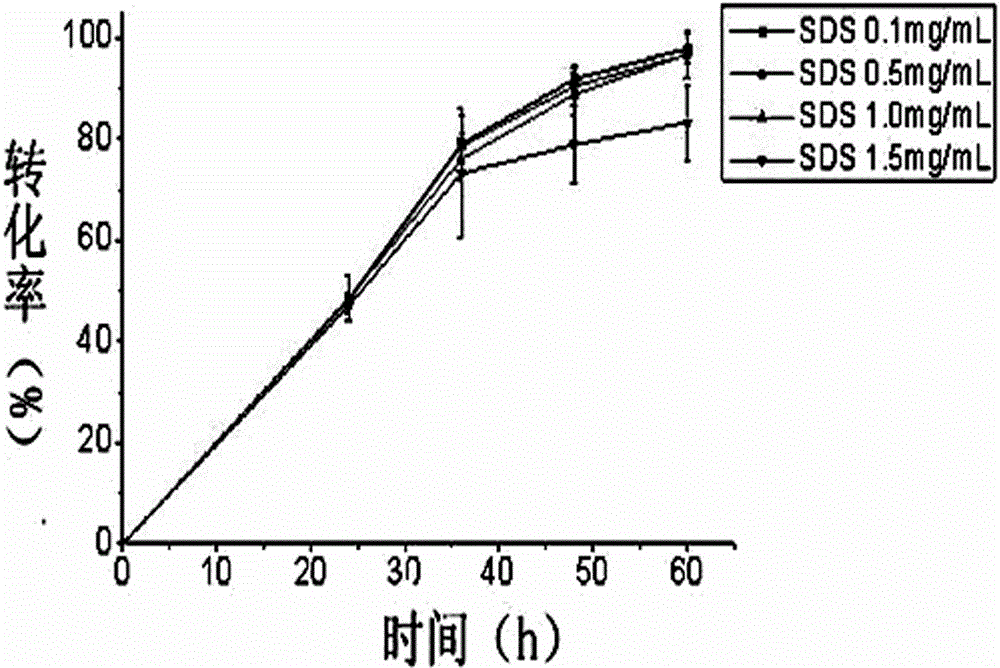Prolyl hydroxylase high-activity self-induced expression method and high-efficiency conversion method for producing trans-4-hydroxy-L-proline by prolyl hydroxylase high-activity self-induced expression method
A technology of proline hydroxylase and expression method, which is applied in the field of high-efficiency transformation, can solve the problems of low substrate input, low transformation efficiency, high price, and unsuitability for industrial production, and achieve good industrial application prospects, low cost, The effect of short conversion reaction time
- Summary
- Abstract
- Description
- Claims
- Application Information
AI Technical Summary
Problems solved by technology
Method used
Image
Examples
Embodiment 1a
[0030] Example 1a Self-inducible expression method of high activity proline hydroxylase in recombinant Escherichia coli engineering bacteria
[0031] Inoculate the single clone of the engineering strain containing the recombinant plasmid into the fermentation medium: glucose 20g / L, yeast extract powder 5 g / L, ammonium sulfate 5 g / L, potassium dihydrogen phosphate 1 g / L, sodium chloride 2 g / L, Magnesium Sulfate Heptahydrate 0.2 g / L, Ferrous Sulfate Heptahydrate 0.1 g / L and Lactose 8 g / L, after self-induction culture directly at 28°C and 140rpm shaker for 24 hours, when the concentration of the bacterial solution is OD 600 When reaching 2-2.5, centrifuge to collect the bacteria.
Embodiment 1b
[0032] Example 1b Self-inducible expression method of high activity proline hydroxylase in recombinant Escherichia coli engineering bacteria
[0033] Inoculate the single clone of the engineering strain containing the recombinant plasmid into the fermentation medium: glucose 20g / L, yeast extract powder 5 g / L, ammonium sulfate 5 g / L, potassium dihydrogen phosphate 1 g / L, sodium chloride 2 g / L, magnesium sulfate heptahydrate 0.2 g / L, ferrous sulfate heptahydrate 0.1 g / L and lactose 8 g / L, after self-induction culture directly at 24°C and 220rpm shaking table for 20 hours, when the concentration of bacteria solution is OD 600 When reaching 2-2.5, centrifuge to collect the bacteria.
Embodiment 1c
[0034] Example 1cSelf-inducible expression method of high activity proline hydroxylase in recombinant Escherichia coli engineering bacteria
[0035] Inoculate the single clone of the engineering strain containing the recombinant plasmid into the fermentation medium: glucose 20g / L, yeast extract powder 5 g / L, ammonium sulfate 5 g / L, potassium dihydrogen phosphate 1 g / L, sodium chloride 2 g / L, Magnesium Sulfate Heptahydrate 0.2 g / L, Ferrous Sulfate Heptahydrate 0.1 g / L and Lactose 8 g / L, after self-induction culture directly at 37°C and 180rpm shaker for 22 hours, when the concentration of bacteria solution is OD 600 When reaching 2-2.5, centrifuge to collect the bacteria.
PUM
 Login to View More
Login to View More Abstract
Description
Claims
Application Information
 Login to View More
Login to View More - R&D
- Intellectual Property
- Life Sciences
- Materials
- Tech Scout
- Unparalleled Data Quality
- Higher Quality Content
- 60% Fewer Hallucinations
Browse by: Latest US Patents, China's latest patents, Technical Efficacy Thesaurus, Application Domain, Technology Topic, Popular Technical Reports.
© 2025 PatSnap. All rights reserved.Legal|Privacy policy|Modern Slavery Act Transparency Statement|Sitemap|About US| Contact US: help@patsnap.com



